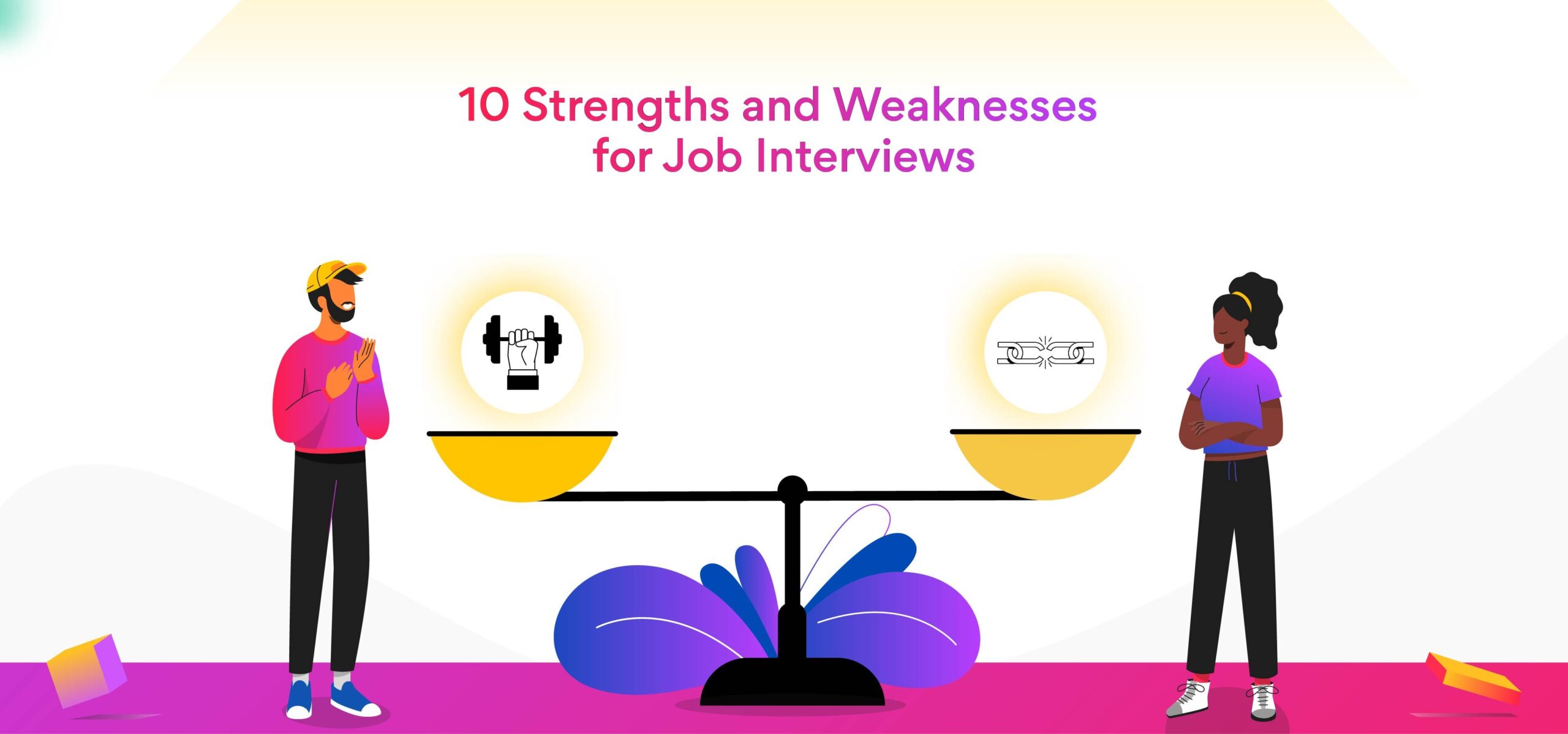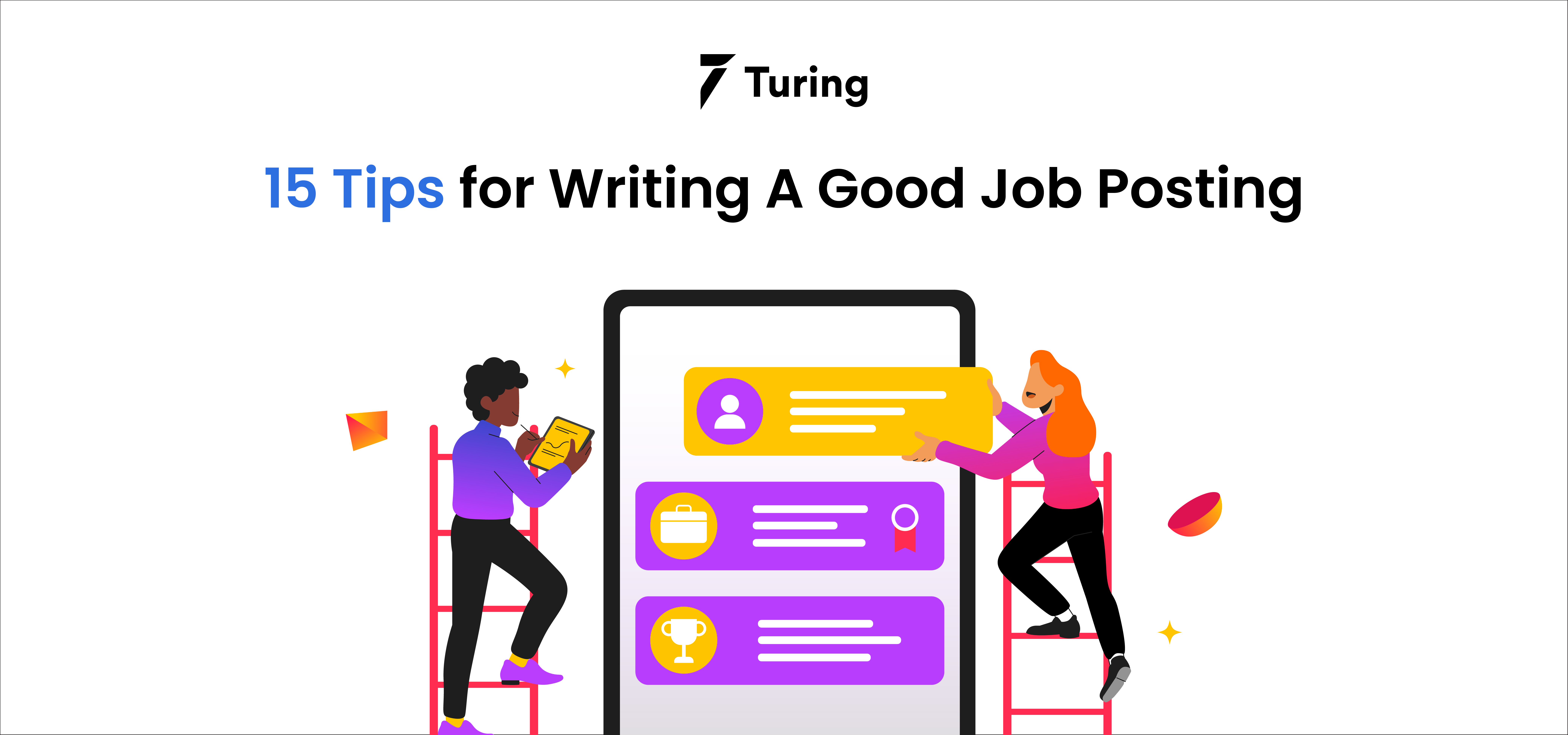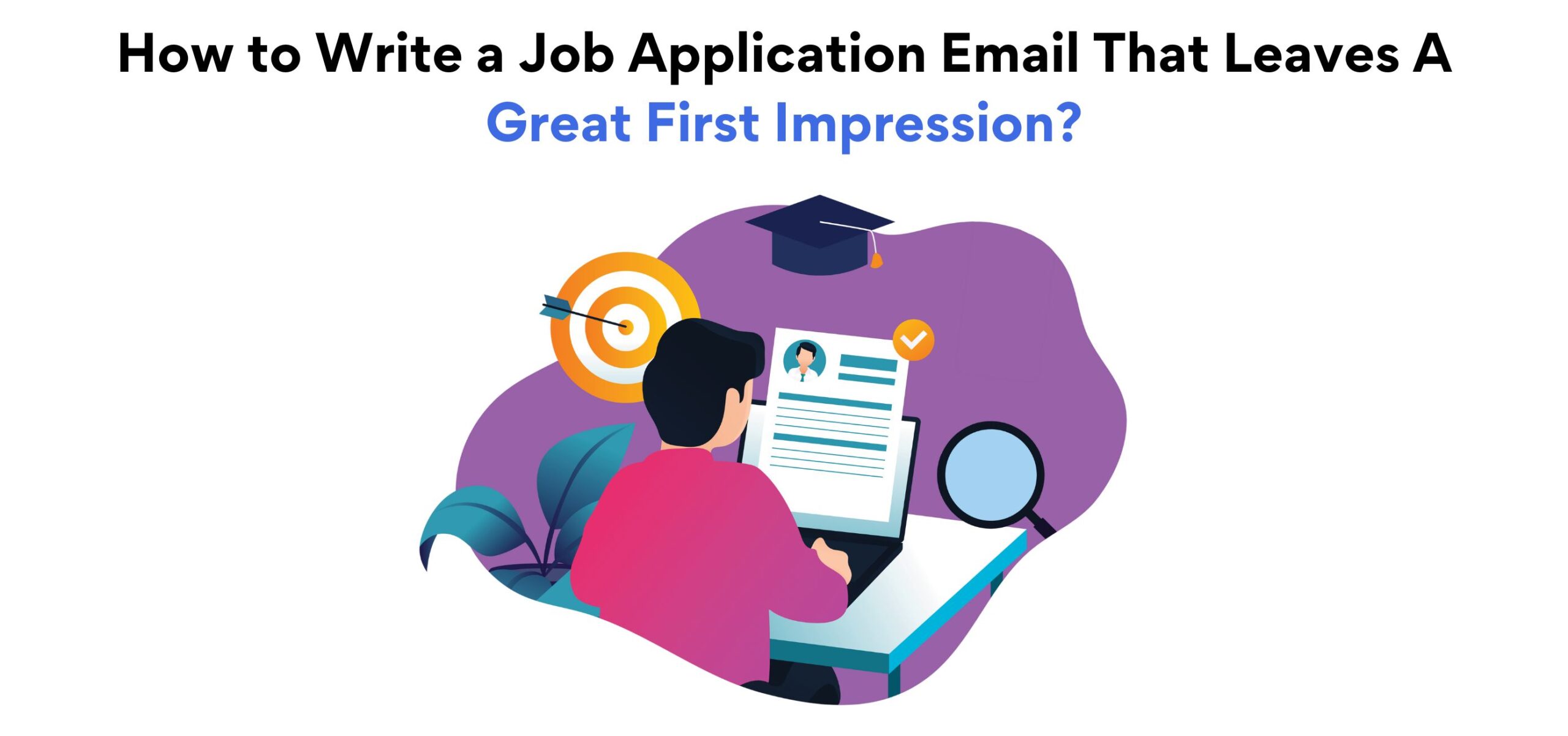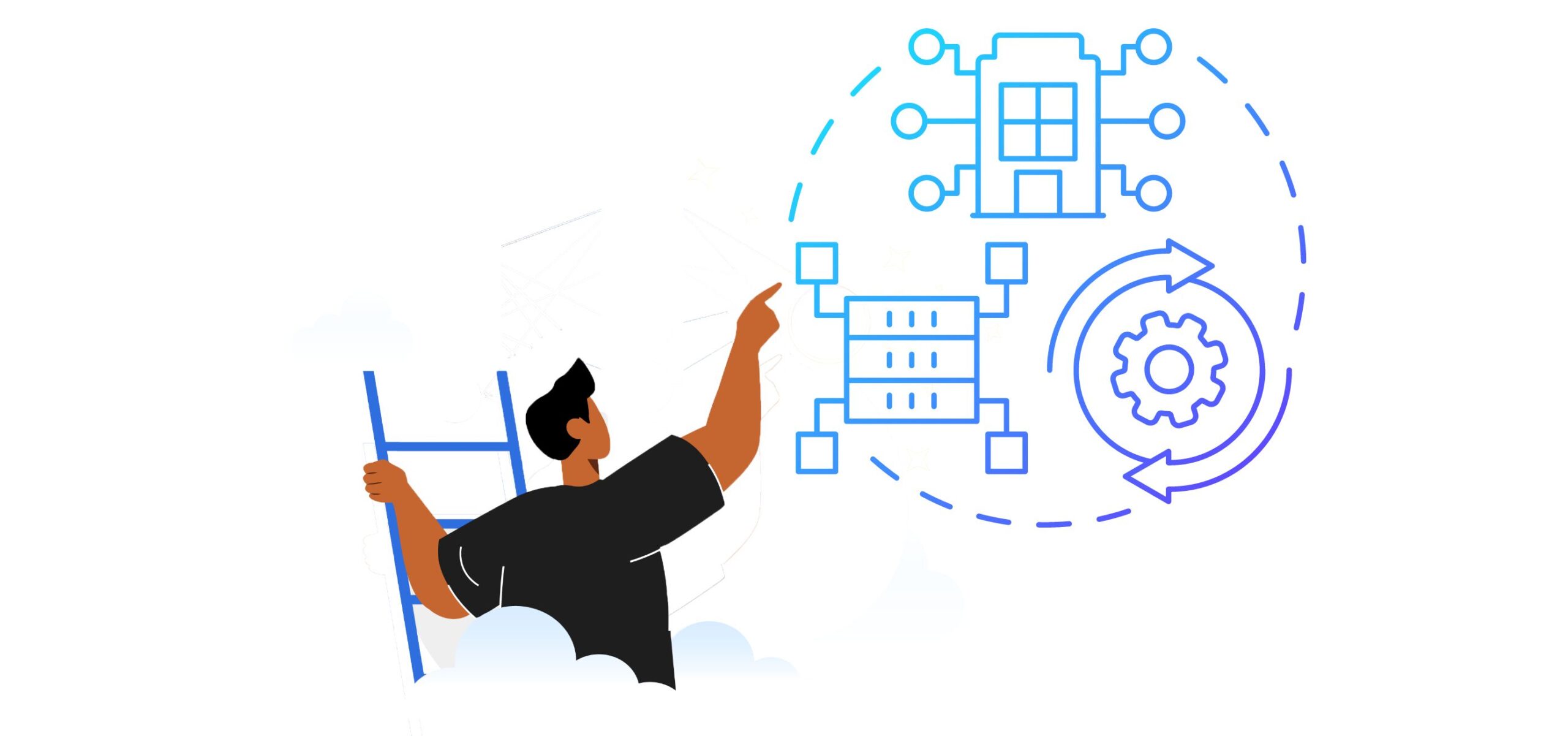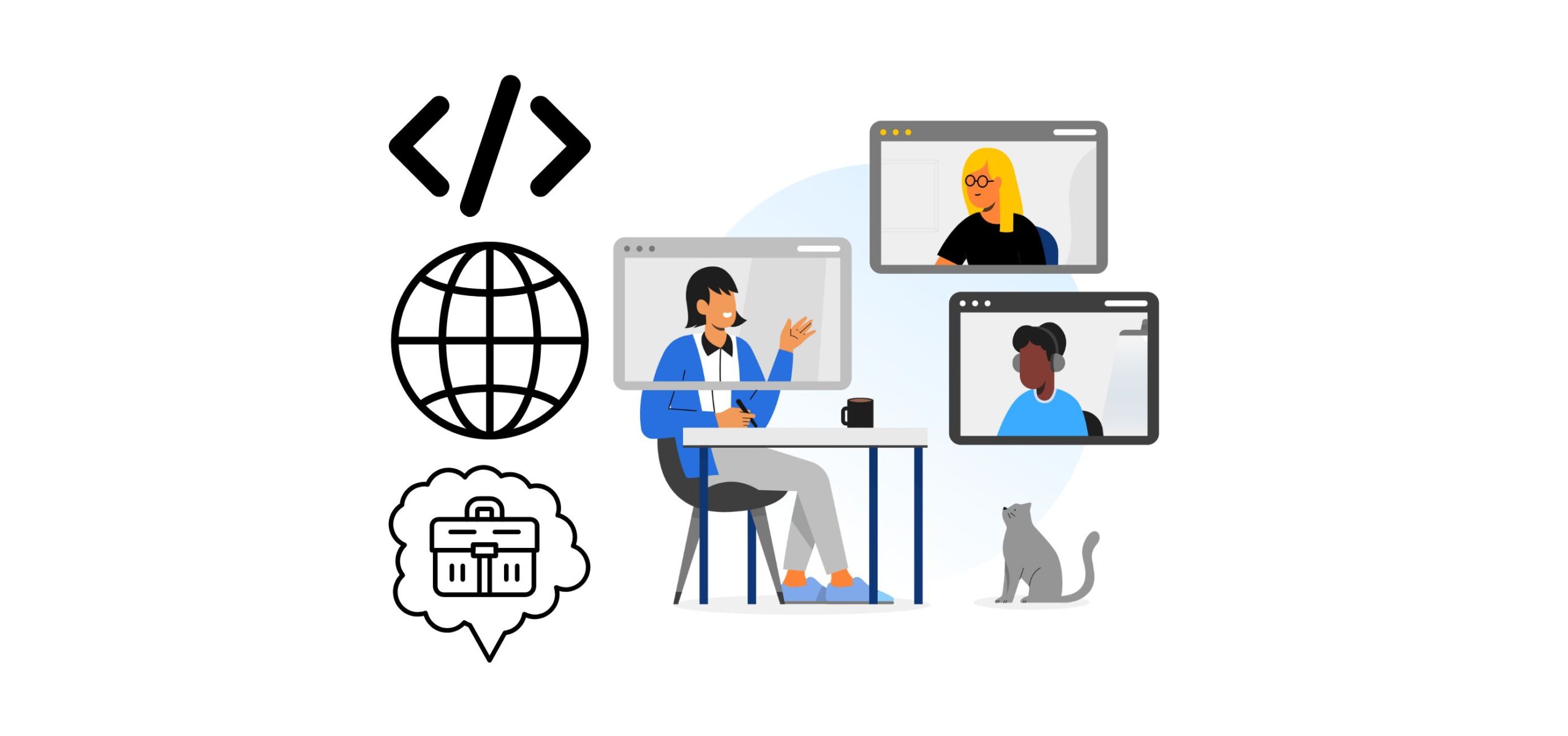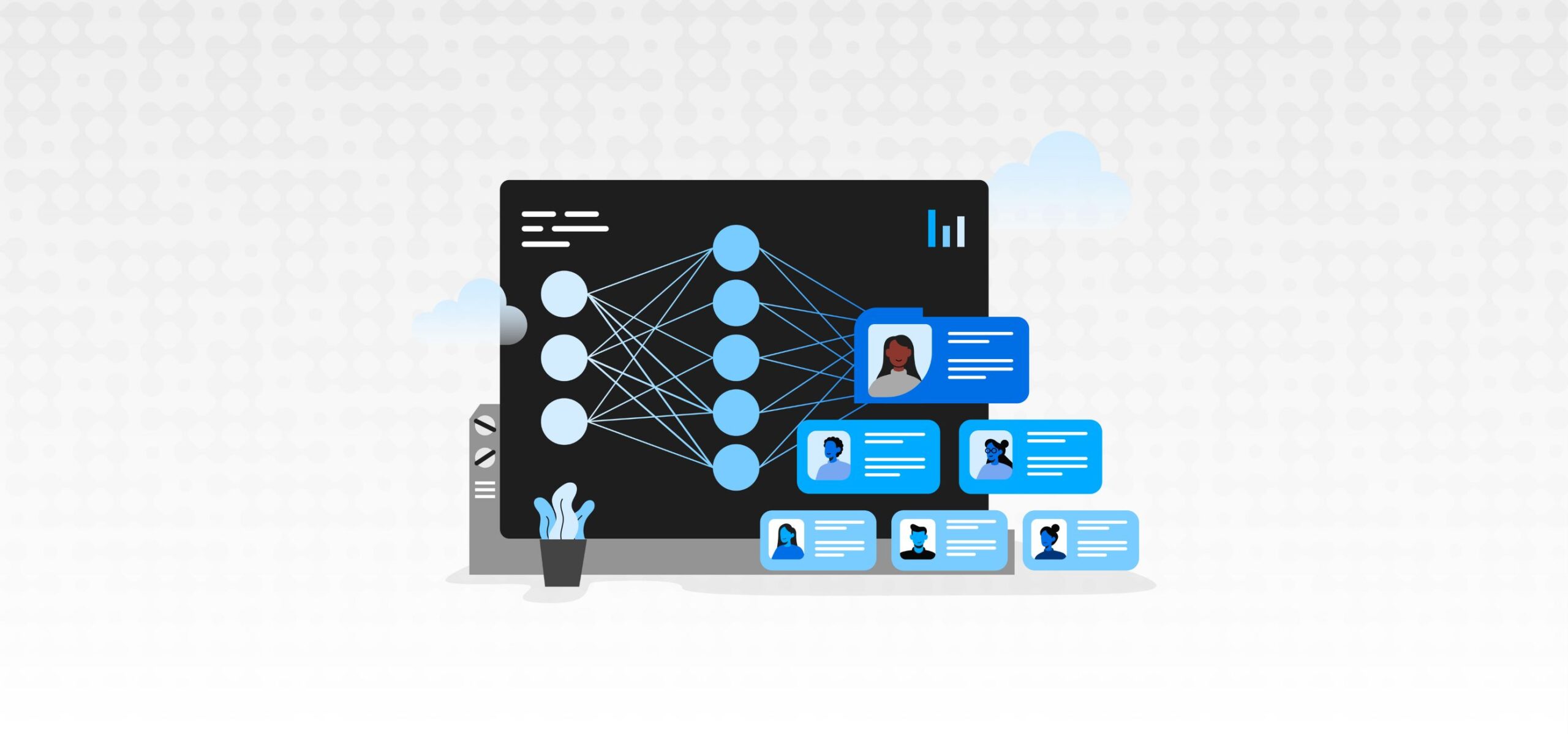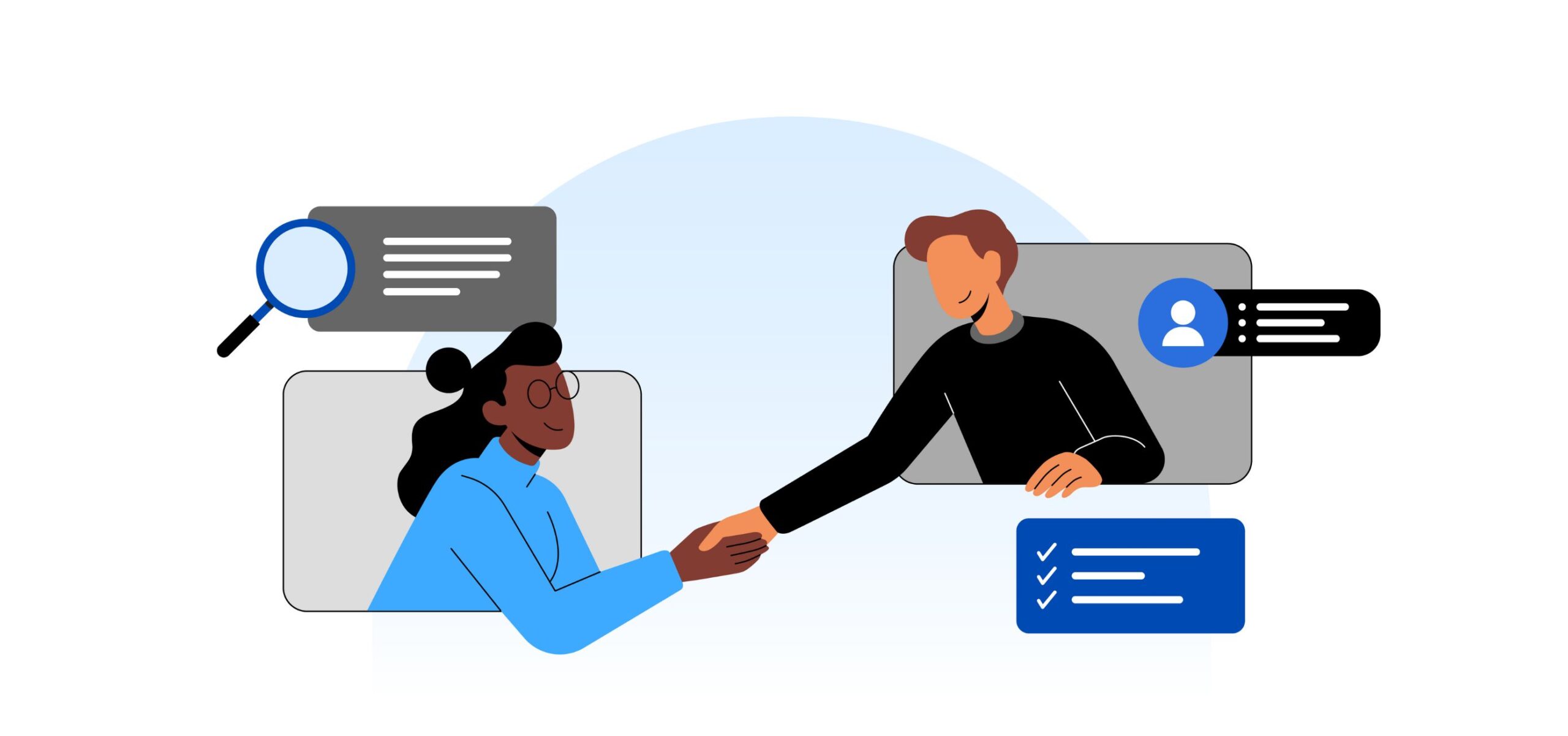10 Strengths and Weaknesses for Job Interviews
How do you answer the question: what are your strengths and weaknesses? Why do interviewers ask about strengths and weaknesses in a job interview? What are common employee strengths? What are common employee weaknesses?
This blog post will help you answer all of the above questions.
Why do interviewers ask about strengths and weaknesses?
Every interviewer asks questions to learn about the value you will bring to the organization. So, by asking about your strengths and weaknesses, they try to figure out the following…
- Whether you are conscious of your best qualities and how you apply them at work.
- Whether you can discuss your shortcomings and how you try to overcome them.
- Whether your qualities and skills will complement existing team members.
And so, bragging about your strengths while hiding weaknesses can make you appear arrogant. On the other hand, answering such questions correctly gives you a great opportunity to show the interviewer that you’re a self-aware individual.
Remember, interviewers love honest, humble candidates who know their strengths and are willing to admit their weaknesses.
How do you talk about your strengths during an interview?
Most applicants wonder how to answer the question: what are your strengths? So don’t worry. You’re not alone. To begin with, ensure you answer the question in a professional manner without boasting or coming off as egocentric. You can even share an engaging story that highlights your strong suits rather than just giving a one-lined, bland answer like: I’m detail-oriented and hard-working.
Make a list of your personal strengths, or ask a friend to assist you in this process. If you are not aware of your strengths, you can take free online assessments or follow the below-mentioned steps.
Here are six steps to identify your strengths…
- Brainstorm: Sit down and list your strengths. Think really hard and aim for at least 10. Take notes of every strength you can think of. You can always make changes to the list later.
- Prepare examples: Instead of just mentioning the strength in one word, share an example based on your work experience where you displayed your strength. Scroll down for some examples if you’re unsure how to do this.
- Be accurate: Make sure to pick the skills you actually have. Refrain from sounding too general. Choose “relationship building” or “persuasive communication” instead of “people skills” or “good communicator.” The latter are often overused.
- Don’t be too modest: This is not the time to be self-conscious. You need to use this question to show what value you can bring to the company. And so, it is important to practice your answers. If you plan ahead, you will be able to answer the question in a way that feels natural and genuine.
- Look for hints in your performance reviews: Go through past performance assessments. Look for the compliments you received from your peers and manager. Go through old emails that praised your work.
- Get technical: Several online tools can help you identify your strengths. All you need to do is answer a series of questions to obtain a report that lists your key strengths.
Here are five common strengths and examples of each…
- Leadership skills
A great example of strength for a job interview is leadership skills. Demonstrating this skill can help you land a key managerial role. You can list instances in your previous company where you guided your peers to do better or spearheaded a project to achieve a goal.
Sample answer: I managed a large marketing team and helped new recruits crack their first assignment by guiding them throughout the project. With the same ad budget allocated to our team as the previous quarter, I was able to increase sales by 30 percent. - Communication skills
Candidates with good communication skills leave a lasting impression on recruiters. They come across as strong, confident individuals. There are four main types of communication: Verbal, non-verbal, visual, and written. In a job interview, you should be well-prepared to leverage all four.
Sample answer: As a part of my last role, I communicated with a variety of clients on a day-to-day basis. I made sure to understand their requirements clearly before working on them. I also crosschecked all information before conveying it ahead. In addition, I ensured there were no communication silos in the team by promoting transparency. - Dedication
Dedication and commitment are important traits that can help candidates impress recruiters. Candidates who can convince recruiters that they have the hunger for success and give their 110 percent do well in the hiring process.
Sample answer: I am a passionate and disciplined individual who works with dedication and commitment on assigned projects. I take care of every little detail to ensure that the objective we have set out to achieve gets accomplished at all costs. - Positive attitude
Candidates with a positive attitude always look at the bright side and face challenges in a stride. They work toward finding a solution instead of getting stumped. Naturally, such individuals are a great asset to any company. Their optimism keeps the team’s morale high and drives them to do better.
Sample answer: My greatest source of strength is a positive attitude that helps me approach things with a forward-thinking mindset. I look to fix problems instead of crying over their outcome. My seniors in the previous company always praised my optimism and said that it served as motivation for them. - Hard skills
Along with soft skills, it is equally important to share a few hard skills relevant to the job role as strengths for job interviews. Hard skills are objective, quantifiable skills gained through education, training, or work experiences. Hard skills can often be taught or learned. And so, hard skills can be easily proven — you either know how to write code, or you don’t.
Sample answer: I am a software developer with 10 years of experience with programming languages like JavaScript, Python, Kotlin, C#, Go, and PHP, among others. I am also well-versed in front-end and back-end frameworks, cloud computing, big data analytics, and microservices architecture.
Here are a few more examples to answer – What are your greatest strengths?
- I’ve always picked things quickly. My hunger to keep learning and evolving as a person is one of my key strengths. I work hard to become a better version of myself every day.
- I am great at interacting with others, working in a variety of teams, and collaborating on a wide range of projects. As the head boy of my school, I encouraged my batch mates to participate in school events to ensure representation. In college, I participated in extracurricular activities with the drama and debate community, volunteered for NGOs, and was also nominated as a campus ambassador for several internships.
- My ability to relate to people and comprehend their needs is my greatest strength. For example, during one summer internship, I got a call from an angry customer who had been terminated from our service. The company was unable to help her. However, I helped her consider other options and she got really happy with the solution.
Related post: Ten Tips to Crack a Software Developer Job Interview
How do you talk about your weaknesses?
One of the most dreaded interview questions is: what are your weaknesses?
Here’s the thing: it’s okay to talk about your weaknesses. All you need to do is find the right balance while doing so. Claiming you have no flaws can make you sound arrogant in the interview. On the other hand, listing down too many can harm your chances of landing a job.
You must project an air of humility while talking about your weaknesses. At the same time, you must also show a strong willingness to overcome them. For this, you need to identify shortcomings that you’re already working on. Ask a friend or close coworker to help you with this. If you’re still struggling…
Here are three steps to identify your weaknesses…
- Self-evaluate: Look at your past performance and make a list of the instances where you fell short of expectations. Examine this list to identify patterns. These patterns are can be your weak points.
- Solicit feedback: Asking for feedback from coworkers or supervisors is one of the best strategies to recognize your professional inadequacies. Your colleagues certainly know your working style better than anybody else and can provide good insights.
- Review performance metrics: You can examine this qualitative data from your previous performance evaluations to get a better understanding of any weaknesses.
If the above-mentioned steps do not help, pick some weaknesses and examples from the list below that are most relatable to your personality.
Here are five common weaknesses and examples of each…
- Obsession with small details
A major weakness for job interviews is the inability to submit projects on time till everything is perfect. Candidates who obsess over the tiniest of details and worry over things not being perfect often miss the big picture. Recruiters want candidates who do not compromise the project in terms of both time and work quality.
Sample answer: My weakness is that I overanalyze my projects and redo them without getting initial client feedback. I am working on this area by sharing my project progress with my colleagues and seniors so that I do not compromise my team’s productivity and project deadlines. - Difficulty saying no
Candidates who find it difficult to say no can find themselves taking on more work than they can do. Candidates who overwork comprise not only their own but also their team’s work quality. And so recruiters prefer hiring candidates who’re aware of the fine line between dedication and overworking.
Sample answer: I want to tell you that I find it difficult to say no to my seniors and colleagues. I think I will upset them, and it will negatively affect our professional relationship. However, I am working on this trait as I understand that if I keep doing it, I will suffer from constant burnout and eventually hamper my team’s performance. - Lack of self-awareness
Self-awareness is essential in giving an honest assessment of one’s skills. Candidates who lack self-awareness can find it difficult to talk about their strengths and weaknesses in job interviews. In contrast, self-aware candidates know their strong suits and shortcomings well.
Sample answer: I did not know that I was bad at integrating code until my previous manager revealed it to me. After that, I took some code integration workshops and attended coding boot camps where they taught code integrations. I am slowly improving and am open to such feedback from my colleagues. - Delegation
Lack of delegation skills can prove to be a major challenge for employees irrespective of their job position. Candidates who cannot delegate in a timely organized manner need to trust their colleagues more and offer them a chance to learn and grow.
Sample answer: I find it difficult to delegate as I think I am not in control of the project anymore. I have worked hard to get over this mindset and constantly tell myself that it is my duty to help other team members learn from me. Now I am delegating more and more tasks to my colleagues. However, I make sure to go over everything once before sending it ahead. - Striking a good work-life balance
Candidates who fail to strike a good work-life balance start hating their job eventually. After spending all the time at work, candidates can feel depressed and lonely. Such candidates need to organize their tasks and plan their time. So, they can turn one of their weaknesses for job interviews into their strengths.
Sample answer: It was quite difficult to strike a balance between work and my personal life. I used to neglect my family for work and often miss out on important days. After a while, I discussed this with my HR and now I have a new timetable for work which tells me to get out of the office early on specific days.
Here are a few more examples to answer – What are your biggest weaknesses?
- My tendency to be overly critical of myself is my biggest weakness. Early in my career, I always concentrated on what I wasn’t particularly good at rather than appreciating how far I had gone and how I could improve. I’ve discovered that deliberately seeking out opportunities to reflect and put more of an emphasis on accomplishments while also continuously bettering myself is the greatest method to break this behavior.
- I strive for perfection. I always look for ways to make things better until I’m satisfied with them, sometimes even going above and beyond. My friends always expressed concern about this habit of mine. I didn’t realize it myself until a college assignment a few years ago. My drive to strive for perfection nearly cost my team the course’s credits. I took that as a lesson and have since made it a point to complete tasks on time, with my best effort, and with a sense of satisfaction.
- My biggest flaw is that sometimes I deprioritize simple tasks and only work on challenging jobs. However, I’m currently working on this issue. I am learning to prioritize tasks according to submission deadlines. I have also started asking my colleagues and managers to put specific timelines or priority levels for all tasks.
Related post: Six Common Interview Mistakes Remote Developers Make
List of common strengths and weaknesses
|
Strength |
Weakness |
|
Creative Versatile Disciplined Proactive Honest Dedicated Fast Learner Self-aware |
Self-critical Insecure Extremely Introverted Extremely Extroverted Too detail-oriented Too sensitive Impatience Difficulty delegating tasks |
Summary
To answer questions related to strengths and weaknesses for job interviews, it is important that you are honest with yourself and the interviewer. In addition, you must narrate your personal experiences and tie them with the question that interviewers ask to give a compelling answer that can increase your chance of getting a job.
Are you looking for software development jobs?
Try Turing. Turing offers remote software developer jobs with unmatched compensation and long-term career growth in top US companies. Visit our jobs page to know more.
FAQs
- How do you answer what are your strengths and weaknesses for job interviews?
While discussing your strengths and weaknesses in a job interview, ensure that you narrate personal or professional incidents that made you aware of your strong suits and shortcomings.
- What are common employee strengths?
Some common employee strengths include leadership skills, communication skills, self-motivation, empathy, initiative, and patience, among others.
- What are common employee weaknesses?
Some common employee weaknesses include lack of delegation, insecurity, no self-awareness, lack of confidence, and no knowledge of particular skills, among others.
Join a network of the world's best developers and get long-term remote software jobs with better compensation and career growth.
